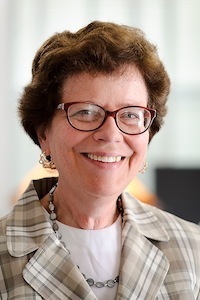Blank speaks to Faculty Senate about challenges and opportunities
Chancellor Rebecca Blank on Monday spoke to the Faculty Senate about critical issues facing UW–Madison, including the need to ensure financial stability at an institutional level, improve relations with legislators, and shrink the pay gap with our peers.

Rebecca Blank
It was Blank’s first address to the Faculty Senate, which held its first meeting since Blank arrived on campus in late July.
Blank said she sees her main task as chancellor to be continuing to maintain the high level of quality in instruction and research UW–Madison has achieved over more than 160 years, and where possible move it forward.
“But that doesn’t mean keeping things just as they are,” she said. “To stay good at what we do, and to become better, will require us to do some things differently because the higher education world in which we operate and the larger economic and social world in which we operate is changing.”
Blank said one of her most pressing priorities is to restore financial stability to the university, and acknowledged that the funding model for public universities has undergone a significant amount of change, particularly in the amount of state support.
“While we must and will argue with the state for additional funds for high priority needs, I will tell you I don’t expect a big turnaround in that trend,” she said.
Universities must work hard to capture other streams of funding and integrate them with the state contribution, she said. Those funding streams include federal dollars, tuition, funding from business partnerships, private donors, and the support of partners like the Wisconsin Alumni Research Foundation.
Blank acknowledged that the debate over the use of reserve funds resulted in a difficult budget session for the UW System this spring.
“To stay good at what we do, and to become better, will require us to do some things differently because the higher education world in which we operate and the larger economic and social world in which we operate is changing.”
Rebecca Blank
“I’ll be blunt. We did not effectively make the case for why the University of Wisconsin System schools were experiencing growth in their reserve funds at the same time we were going to the state legislature claiming serious economic problems and asking for tuition increases,” she said.
She said the system lost credibility during the debate over reserve funds, resulting in a tuition freeze and funding cuts, and there is still anger among some legislators over the issue.
The university is now spending down those reserve funds, as requested by legislators, Blank said.
“But we can spend those reserves only once. That is one-time money, while the budget cuts that we were given are permanent. And that means come the next biennium, we are going to be facing a budget deficit. I and other leaders across the system are going to be talking to the governor and legislature in the hope that in the next budget process we can get at least some of those dollars restored,” Blank said.
The tuition freeze was “not a surprising reaction” to an honest concern among legislators about the rising cost of higher education, Blank said, adding that she is “acutely aware” of the economics of the state.
“I want any Wisconsin student who has the academic credentials to be admitted to the University of Wisconsin–Madison to be able to attend here, regardless of their family’s income,” she said.
“I want any Wisconsin student who has the academic credentials to be admitted to the University of Wisconsin–Madison to be able to attend here, regardless of their family’s income.”
Rebecca Blank
One of the most regrettable outcomes of the budget battle this spring was the delay in human resources flexibilities, particularly in the area of compensation, Blank said. She pledged to work with UW System officials to gain the authority for those flexibilities for faculty and all employee categories in the 2015 budget, but it is “no slam dunk.”
“It is going to take real effort and some real political skill to get [legislators] to approve the HR flexibilities in that timeframe,” she said. “But I think this is incredibly important to campus.”
Despite the lack of flexibility, she said some modest gains have been made over recent years to address the pay gap with the university’s peers. Two important tools have been the critical compensation fund and high-demand faculty fund, and she proposes that internal dollars be made available, though she expects the amount allocated to be more modest than last year.
Details of the programs will be worked out with governance groups and internal stakeholders in the coming weeks, Blank said.
“I consider this one of the highest priority uses of our budget,” she said.
Noting that for the third straight year UW–Madison ranked 19th worldwide in the recent Academic Ranking of World Universities by Shanghai’s Jiao Tong University, Blank praised the faculty on the accomplishment
“That’s the level of excellence you have achieved here over the years and I am pledged to uphold,” she said. “There are some pretty big challenges — I’m not going to sugarcoat that — but there are also enormous opportunities. And I’m excited to work with all of you on both the challenges and the opportunities.”




